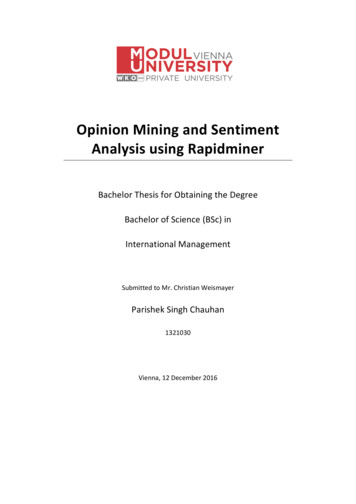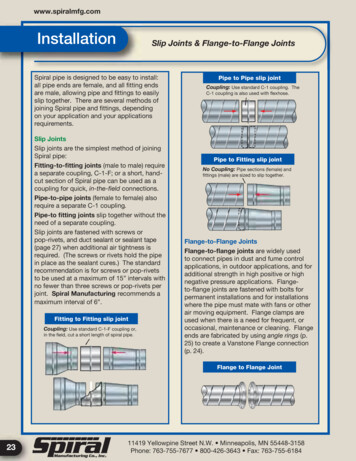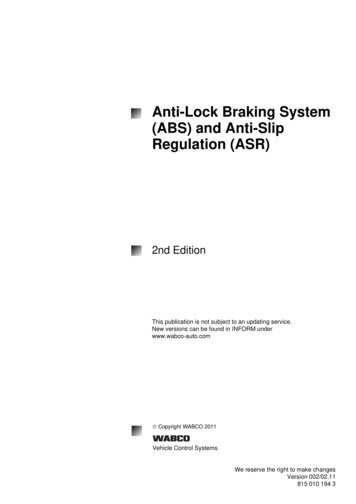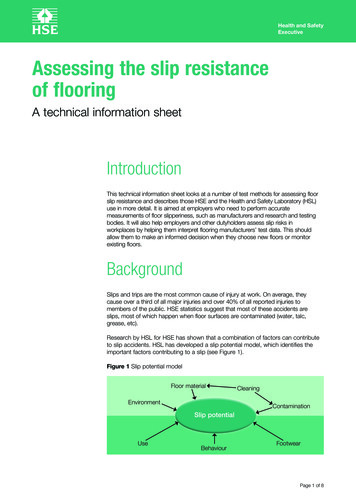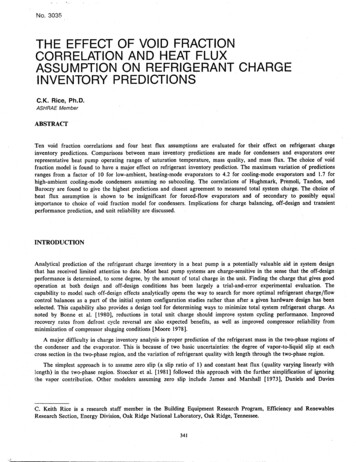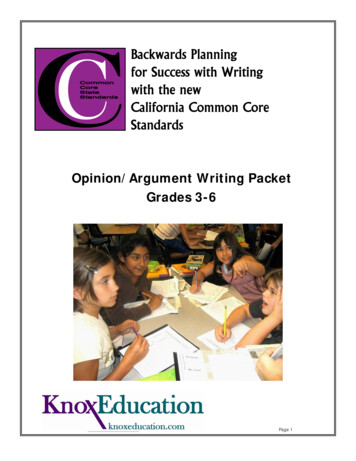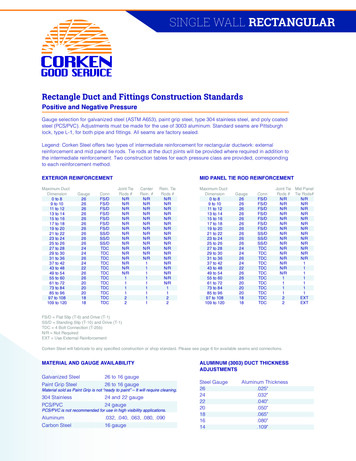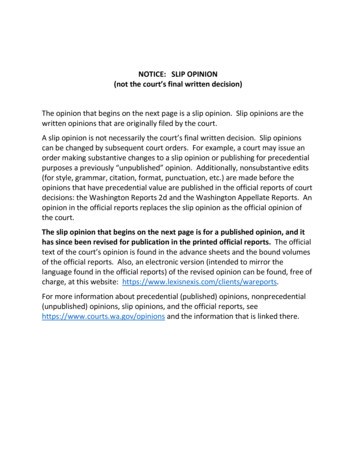
Transcription
NOTICE: SLIP OPINION(not the court’s final written decision)The opinion that begins on the next page is a slip opinion. Slip opinions are thewritten opinions that are originally filed by the court.A slip opinion is not necessarily the court’s final written decision. Slip opinionscan be changed by subsequent court orders. For example, a court may issue anorder making substantive changes to a slip opinion or publishing for precedentialpurposes a previously “unpublished” opinion. Additionally, nonsubstantive edits(for style, grammar, citation, format, punctuation, etc.) are made before theopinions that have precedential value are published in the official reports of courtdecisions: the Washington Reports 2d and the Washington Appellate Reports. Anopinion in the official reports replaces the slip opinion as the official opinion ofthe court.The slip opinion that begins on the next page is for a published opinion, and ithas since been revised for publication in the printed official reports. The officialtext of the court’s opinion is found in the advance sheets and the bound volumesof the official reports. Also, an electronic version (intended to mirror thelanguage found in the official reports) of the revised opinion can be found, free ofcharge, at this website: https://www.lexisnexis.com/clients/wareports.For more information about precedential (published) opinions, nonprecedential(unpublished) opinions, slip opinions, and the official reports, seehttps://www.courts.wa.gov/opinions and the information that is linked there.
For the current opinion, go to https://www.lexisnexis.com/clients/wareports/.THIS OPINION WAS FILEDFILEFOR RECORD AT 8 A.M. ONFEBRUARY 4 2021IN CLERK’S OFFICESUPREME COURT, STATE OF WASHINGTONFEBRUARY 4, 2021SUSAN L. CARLSONSUPREME COURT CLERKIN THE SUPREME COURT OF THE STATE OF WASHINGTONIn the Matter of the Personal Restraint of ))VINCENT L. FOWLER,))Petitioner.))No. 97456-0En BancFiled: February 4, 2021GONZÁLEZ, C.J.— The writ of habeas corpus is enshrined in our state andfederal constitutions. WASH. CONST. art. I, § 13; U.S. CONST. art. I, § 9. Ourlegislature has the power to expand habeas corpus and frame it in ways that do notimpinge on the writ’s fundamental nature. See In re Pers. Restraint of Runyan,121 Wn.2d 432, 444-45, 853 P.2d 424 (1993). Reasonable time limits, withappropriate exceptions, are constitutionally permissible. Id. at 444. In our state,those restrained under facially valid judgments have at least a year to bring ahabeas-style challenge. RCW 10.73.090, .100. A year after that judgment is final,the statutory grounds for relief that may be raised are limited. RCW 10.73.090,.100. In keeping with the importance of the writ, the one-year time limit is subjectto equitable tolling in extraordinary circumstances. See In re Pers. Restraint ofHaghighi, 178 Wn.2d 435, 447-48, 309 P.3d 459 (2013); State v. Littlefair, 112
For the current opinion, go to https://www.lexisnexis.com/clients/wareports/.In re Pers. Restraint of Fowler, No. 97456-0Wn. App. 749, 759, 51 P.3d 116 (2002); see also Pace v. DiGuglielmo, 544 U.S.408, 418, 125 S. Ct. 1807, 161 L. Ed. 2d 669 (2005) (citing Irwin v. Dep’t ofVeterans Affairs, 498 U.S. 89, 96, 111 S. Ct. 453, 112 L. Ed. 2d 435 (1990)).Long before his judgment and sentence was final, Vincent Fowler hired andpaid an attorney, John Crowley, to prepare and file his personal restraint petition(PRP). But after repeatedly and falsely assuring his client he was working on thePRP, Crowley stopped responding to calls. As the one-year time bar approachedand it became apparent Crowley had abandoned him, Fowler hired a new attorney.Fowler learned Crowley had resigned his law license rather than face professionaldiscipline for failing to diligently represent other clients, among other things.Before the time bar passed, Fowler’s present counsel filed a “placeholder” PRPexplaining he needed additional time to get Fowler’s legal file and investigategrounds for relief. After the time bar had passed, counsel filed a “supplemental”PRP arguing Fowler’s trial attorney was ineffective. The Court of Appealsdismissed the PRP as untimely.This court has inherent authority to grant a timely filed motion to extend thetime limit to file a habeas-style challenge to a conviction. See In re Pers. Restraintof Davis, 188 Wn.2d 356, 362 n.2, 395 P.3d 998 (2017). Further, courts have theauthority, under appropriate circumstances, to equitably toll the statutory time limiton personal restraint petitions and habeas petitions. Haghighi, 178 Wn.2d at 447;2
For the current opinion, go to https://www.lexisnexis.com/clients/wareports/.In re Pers. Restraint of Fowler, No. 97456-0Littlefair, 112 Wn. App. at 759; Pace, 544 U.S. at 418. We conclude that equitabletolling is warranted here. The misconduct of Fowler’s attorney was egregious andFowler exercised diligence. We reverse the Court of Appeals and remand forconsideration on the merits.FACTSFowler was convicted of two counts of first-degree child molestation andone count of first-degree rape of a child. The Court of Appeals affirmed. State v.Fowler, No. 33227-6-III, slip op. at 1 (Wash. Ct. App. Aug. 18, 2015)(unpublished), df. Wegranted review and remanded for correction of an unrelated error. The superiorcourt entered an amended judgment and sentence on October 19, 2016. Before thejudgment was final, Fowler’s brother Darryl Fowler hired an attorney to prepareand file a PRP for Fowler. Darryl 1 hired John Crowley on September 2, 2015,more than two years before the PRP’s due date of October 20, 2017. Darryl paidCrowley a significant retainer in advance.While incarcerated at Stafford Creek Corrections Center, Fowler was able tospeak with Crowley “on only a couple of occasions, and he called me ‘Victor.’”Suppl. Br. of Pet’r, Ex. D, ¶ 16 (Decl. of Vincent Fowler) (Wash. Ct. App. No.51029-4-II (2018)). Crowley falsely assured his client that he was working on his1We use Darryl Fowler’s first name for clarity. No disrespect is intended.3
For the current opinion, go to https://www.lexisnexis.com/clients/wareports/.In re Pers. Restraint of Fowler, No. 97456-0PRP and “had all sorts of plan[s] of what he was going to do.” Id. Crowleybecame more difficult to reach, and in June 2017, all of Fowler’s calls startedgoing to voice mail. Fowler’s brother and other family members attempted tocontact Crowley “numerous times, but to no avail.” Suppl. Br. of Pet’r, Ex. F, ¶ 3(Decl. of Darryl Fowler) (Wash. Ct. App. No. 51029-4-II (2018)). In August of2017, just two months before the PRP was due, Fowler discovered that Crowley’sphone line was disconnected. During this time, it did not appear that Crowley hadproduced anything for Fowler’s case.Meanwhile, and unknown to Fowler, Crowley was under investigation forprofessional misconduct in other cases where he had taken a fee and done little orno work. On July 18, 2017, Crowley resigned from the practice of law rather thanface professional discipline.As the one-year time bar approached and it became apparent Crowley hadabandoned his brother, Darryl hired a new attorney. Darryl met with John HenryBrowne on October 6, 2017 and almost immediately hired him. Browne informedDarryl that Crowley had “retired . . . in lieu of discipline and disbarment.” Id. at ¶4. This was the first time Darryl or Fowler had heard this. Around the same time,Fowler also heard about Crowley’s incompetence from several other inmates. Therecord suggests Crowley has not returned the unearned fee. Crowley also failed toshare Fowler’s case file with Browne.4
For the current opinion, go to https://www.lexisnexis.com/clients/wareports/.In re Pers. Restraint of Fowler, No. 97456-0Before the deadline passed, Browne filed something he characterized as a“placeholder” petition for review in the Court of Appeals on October 18, 2017.2This petition stated that Fowler’s counsel needed additional time to get Fowler’slegal file and investigate grounds for relief. The Court of Appeals treated Fowler’spetition as a “motion to file a supplemental petition” and directed Fowler toaddress why the one-year time bar under RCW 10.73.090 did not warrantdismissal. Comm’r’s Letter Ruling, No. 51029-4-II (Wash. Ct. App. Nov. 21,2017).In March 2018, after the time bar had run, Fowler’s counsel filed asupplemental petition arguing that the one-year time bar should be equitably tolledbecause Fowler’s prior counsel was ineffective and asserting that the court maywaive the time limit under RAP 18.8. 3 The Court of Appeals held that equitabletolling applies only when a petitioner asserts bad faith, deception, or falseassurances by the opposing party, and that RAP 18.8 does not give the courtauthority to waive the statute of limitations. In re Pers. Restraint of Fowler, 9 Wn.2We note that the State argues the one-year clock began to run on May 2, 2016, when the Courtof Appeals opinion mandated, and not October 19, 2016, when the superior court entered itsamended judgment and sentence. Suppl. Br. of Resp’t at 4. The Court of Appeals correctly heldthat the time bar ran in October, not May. We decline to revisit this holding.3RAP 18.8 allows an appellate court to “waive or alter the provisions of any of these rules andenlarge or shorten the time within which an act must be done in a particular case in order to servethe ends of justice,” subject to certain restrictions.5
For the current opinion, go to https://www.lexisnexis.com/clients/wareports/.In re Pers. Restraint of Fowler, No. 97456-0App. 2d 158, 164-65, 167, 442 P.3d 647 (2019). We granted review. In re Pers.Restraint of Fowler, 195 Wn.2d 1007 (2020).ANALYSISI.Statutory Limitations and Inherent PowerThis court has inherent power to waive the statutory limitations period for ahabeas challenge. Davis, 188 Wn.2d at 362 n.2. This flows from our plenaryjudicial power, which includes original jurisdiction over writs of habeas. Id.;WASH. CONST. art. IV, § 4. Our legislature has the power to expand and framehabeas style challenges, so long as it does not impinge on the writ’s fundamentalnature. See Runyan, 121 Wn.2d at 443-44. Nothing in chapter 10.73 RCWdeprives this court of the authority to extend the time bar in response to a timelyfiled motion based on adequate grounds. See Davis, 188 Wn.2d at 362 n.2.We agree with the Court of Appeals that RAP 18.8 does not grant courts theauthority to waive a statute of limitations. RAP 18.8 states that the “appellatecourt may, on its own initiative or on motion of a party, waive or alter theprovisions of any of these rules and enlarge or shorten the time within which an actmust be done.” RAP 18.8(a). RAP 18.8 applies to court rules—it does not grantthe court the ability to “waive or alter statutes” like the one-year time limit inRCW 10.73.090. In re Pers. Restraint of Benn, 134 Wn.2d 868, 938-39, 952 P.2d116 (1998) (emphasis added). But this court’s inherent power is not related to6
For the current opinion, go to https://www.lexisnexis.com/clients/wareports/.In re Pers. Restraint of Fowler, No. 97456-0RAP 18.8. See Davis, 188 Wn.2d at 362 n.2 (exercising inherent power with noreference to RAP 18.8). The inherent power of this court does not depend on therules of appellate procedure. WASH. CONST. art. IV, §§ 4, 6.The Court of Appeals concluded that “[t]he statutory time limit is amandatory rule that acts as a bar to appellate court consideration of collateralattacks, unless the petitioner shows that a statutory exception applies.” Fowler, 9Wn. App. 2d at 167 (citing State v. Robinson, 104 Wn. App. 657, 662, 17 P.3d 653(2001)). This is incorrect. This court may exercise its inherent power to consider acollateral attack even if it would normally be barred by the statutory time limit.II.Equitable TollingIt is well established that the statutory one-year time bar for filing a PRP isnot jurisdictional and may be subject to equitable tolling. Haghighi, 178 Wn.2d at447. Equitable tolling is a remedy, used sparingly, that allows an action to proceed“when justice requires it, even though a statutory time period has elapsed.” In rePers. Restraint of Bonds, 165 Wn.2d 135, 141, 196 P.3d 672 (2008) (pluralityopinion). We have previously held that equitable tolling in collateral restraintactions is warranted when a petitioner shows they have diligently pursued theirrights and the petition was untimely because of bad faith, deception, or falseassurances. See Haghighi, 178 Wn.2d at 447-48.7
For the current opinion, go to https://www.lexisnexis.com/clients/wareports/.In re Pers. Restraint of Fowler, No. 97456-0We have not considered whether the petitioner’s own attorney’s misconductcan also give rise to cause for equitable tolling. But federal courts, applyingequitable tolling to the statutory time limit for federal habeas petitions, haveconcluded it can. Holland v. Florida, 560 U.S. 631, 653, 130 S. Ct. 2549, 177 L.Ed. 2d 130 (2010); Gibbs v. Legrand, 767 F.3d 879, 882 (9th Cir. 2014). We adoptthis federal standard to supplement our own. A petitioner seeking equitable tollingbears the burden of showing (1) that they diligently pursued their rights and (2)that an extraordinary circumstance prevented a timely filing. Lawrence v. Florida,549 U.S. 327, 336, 127 S. Ct. 1079, 166 L. Ed. 2d 924 (2007) (citing Pace, 544U.S. at 418). Extraordinary circumstances include, but are not limited to, bad faith,deception, or false assurances by another such as, in some cases, a petitioner’s owncounsel. See id.; see also Haghighi, 178 Wn.2d at 447-48. Under this standard,ordinary attorney negligence, such as miscalculating the filing deadline, isgenerally not an extraordinary circumstance. Holland, 560 U.S. at 651-52. Butsufficiently egregious attorney misconduct—such as an attorney’s failure to filetheir client’s collateral challenge despite being timely hired to do so—creates anextraordinary circumstance that justifies equitable tolling. See Baldayaque v.United States, 338 F.3d 145, 152 (2d Cir. 2003) (equitable tolling appropriatewhen counsel failed to file a habeas petition despite being hired to do so, failed toconduct any legal research, and failed to communicate with his client); John Doe v.8
For the current opinion, go to https://www.lexisnexis.com/clients/wareports/.In re Pers. Restraint of Fowler, No. 97456-0Busby, 661 F.3d 1001, 1011-12 (9th Cir. 2011) (equitable tolling appropriate whencounsel failed to timely file a habeas petition despite having promised to do so,even though the petitioner hired him over a year before the deadline, paid him 20,000, gave him the files, and repeatedly asked him about the case); Spitsyn v.Moore, 345 F.3d 796, 798, 800-02 (9th Cir. 2003) (equitable tolling appropriatewhen counsel failed to file a habeas petition even though Spitsyn hired him almosta year before the deadline and contacted him three times and filed two complaintswith the bar). 4The State argues that under Haghighi, equitable tolling is warranted onlywhere the impediment to timely filing involves bad faith, deception, or falseassurances by the opposing party—here, the State. In Haghighi, we declined toapply equitable tolling where a pro se petitioner filed a timely PRP and wasappointed counsel shortly before the time bar, and after the time bar, petitioner’scounsel sought to add an additional constitutional claim. 178 Wn.2d at 440-41,4We recognize that our precedent regarding equitable tolling has not been entirely clear. InBonds, a plurality favored a narrow test requiring “bad faith, deception, or false assurances” to bedemonstrated by the petitioner. 165 Wn.2d at 141 (Johnson, J., lead opinion). But between thedissent and the concurrence, five justices would have allowed equitable tolling to apply inbroader contexts. Id. at 144 (Alexander, C.J., concurring), 147 (Sanders, J., dissenting). As wenoted in In re Pers. Restraint of Carter, “equitable tolling . . . may be available in contextsbroader than those recognized by the Bonds plurality.” 172 Wn.2d 917, 929, 263 P.3d 1241(2011). Most recently, our decision in Haghighi was silent as to whether the “bad faith,deception, or false assurances” must be caused by the opposing party, the State, the defendant, orsimply “another.” See 178 Wn.2d at 447 (recognizing without clarifying that “[a]lthough thiscourt has not previously settled what standard should be applied in this context, traditionally wehave allowed equitable tolling when justice requires its application and when the predicates ofbad faith, deception, or false assurances are met,” as well as petitioner diligence).9
For the current opinion, go to https://www.lexisnexis.com/clients/wareports/.In re Pers. Restraint of Fowler, No. 97456-0449. Because Haghighi knew all the facts relevant to that untimely claim when hefiled his initial PRP and was not prevented from raising it then, equitable tollingwas not warranted. Id. at 449. We were not asked to decide, and therefore did nothold, that equitable tolling was limited to malfeasance by the opposing party. Wesee no reason for such a limitation. Such a limitation would undermine thepurpose of equitable tolling—to ensure fundamental fairness when extraordinarycircumstances have stood in a petitioner’s way. Accordingly, the Court of Appealserred when it stated that “Washington courts require bad faith, deception, or falseassurances caused by the opposing party or the court” in order to justify equitabletolling. Fowler, 9 Wn. App. 2d at 166 (emphasis added).Crowley’s misconduct is the type of extraordinary circumstance that justifiesequitable tolling. See Baldayaque, 338 F.3d at 152; Doe, 661 F.3d at 1011-12;Spitsyn, 345 F.3d at 800-02. Even though Fowler’s family hired Crowley twoyears in advance of the statutory deadline, Crowley completely failed to prepareand file a personal restraint petition. “[F]undamental canons of professionalresponsibility . . . require attorneys to perform reasonably competent legal work, tocommunicate with their clients, to implement clients’ reasonable requests, to keeptheir clients informed of key developments in their cases, and never to abandon aclient.” Holland, 560 U.S. at 652-53 (citing Br. for Legal Ethics Professors et al.as Amici Curiae in Supp. of Pet’r). Crowley violated these canons. He falsely10
For the current opinion, go to https://www.lexisnexis.com/clients/wareports/.In re Pers. Restraint of Fowler, No. 97456-0assured Fowler he was working on the PRP, but in fact, he produced nothing andessentially disappeared, resigning from the practice of law and disconnecting hisphone line without notifying Fowler or returning Fowler’s case file. Fowler had tofind out through another attorney, on the eve of the time bar, that Crowley wasfacing discipline and resigned. And when asked by Fowler’s new attorney for hiscase file, Crowley never provided it.Fowler has shown not only egregious attorney misconduct that preventedhim from timely filing his PRP but also that he diligently pursued his rights.Fowler, through his brother, promptly hired Crowley to prepare his PRP after theCourt of Appeals affirmed his convictions on direct appeal in 2015. The one-yeartime clock for filing his PRP began to run on October 19, 2016. Fowler and hisfamily members reached out to Crowley repeatedly to check on the status of hiscase. When Fowler was able to talk to Crowley, Crowley assured him he wasworking on the case and had plans for the petition. After calls to Crowley startedgoing to voice mail in June 2017 and the October 2017 deadline beganapproaching, Fowler’s brother hired a new lawyer before the deadline. Presentcounsel promptly requested additional time to get Fowler’s legal files, do thenecessary investigation, and prepare Fowler’s PRP raising an ineffective assistanceof trial counsel claim.11
For the current opinion, go to https://www.lexisnexis.com/clients/wareports/.In re Pers. Restraint of Fowler, No. 97456-0The diligence required for equitable tolling is not “exceptional” diligence,Baldayaque, 338 F.3d at 153, or “‘maximum feasible diligence,’” Holland, 560U.S. at 653 (internal quotation marks omitted) (quoting Starns v. Andrews, 524F.3d 612, 618 (5th Cir. 2008)). Instead, a petitioner is required to act as diligentlyas reasonably can be expected under the circumstances. See Holland, 560 U.S. at653; Baldayaque, 338 F.3d at 153. While Fowler recognized as early as June thathe was having difficulty reaching Crowley, his delay until October to obtain newcounsel was reasonable, especially taking into account Crowley’s assurances thathe was working on the case and the fact that Fowler was in prison. See Spitsyn,345 F.3d at 801 (rejecting an argument that a petitioner should have hired a newattorney earlier because “it is not evident that [he] should have concluded . . . [hisattorney] was going to fail [him] completely. Non-responsiveness may beunprofessional, but it is hardly unheard of”); Doe, 661 F.3d at 1014 (holding that apetitioner’s reliance on his absent attorney was reasonable given that the petitionerwas “[u]ntrained in the technicalities of habeas law and incarcerated . . . [and] inno position to . . . observe the thoroughness of the attorney’s supposedly ongoinginvestigation for evidence”).Fowler’s reasonable reliance on his attorney should not deprive him of hissole opportunity to bring his ineffective assistance of counsel claim. Fowler isentitled to equitable tolling of the limitations period from October 19, 2016, when12
For the current opinion, go to https://www.lexisnexis.com/clients/wareports/.In re Pers. Restraint of Fowler, No. 97456-0the limitations period would otherwise have commenced, until October 9, 2017,the date he retained new counsel. Accordingly, his PRP is timely and will beconsidered on the merits.CONCLUSIONHabeas is an important check on state power. Like nearly everything else inour constitutional system of government, habeas-style procedures are subject toreasonable limitations, such as time limits. Courts may equitably toll time limits inextraordinary circumstances where the petitioner diligently pursued their rights.Fowler was diligent and his former attorney’s extraordinary actions prevented thetimely filing of his PRP. We reverse, hold the petition is timely, and remand to theCourt of Appeals for consideration on the merits.13
For the current opinion, go to https://www.lexisnexis.com/clients/wareports/.In re Pers. Restraint of Fowler, No. 97456-0WE CONCUR:14
For the current opinion, go to https://www.lexisnexis.com/clients/wareports/.In the Matter of the Pers. Restraint of Fowler (Vincent L.), No. 97456-0Whitener, J. (dissenting)No. 97456-0WHITENER, J. (dissenting)—This case concerns whether Vincent L.Fowler can bring an untimely personal restraint petition (PRP) when his formercounsel, John Crowley, failed him in numerous ways. The majority holds thatRCW 10.73.090’s one-year statute of limitations has been equitably tolled.I agree with Part I of the majority opinion, which concludes that the Court ofAppeals correctly held that RAP 18.8 does not permit courts to waive the statute oflimitations. I also agree that one’s counsel may, in fact, behave so poorly as topermit equitable tolling of RCW 10.73.090’s one-year time bar. However, I partways with the majority in two areas. First, the majority adopts the federal standardfor equitable tolling without providing a persuasive reason to do so. Second,irrespective of which standard is applied—ours or the federal standard—Fowlerdid not exercise diligence in pursuit of his rights. Thus, we should not hold that thestatute of limitations has been equitably tolled and should instead affirm the Courtof Appeals. For those reasons, I respectfully dissent.1
For the current opinion, go to https://www.lexisnexis.com/clients/wareports/.In the Matter of the Pers. Restraint of Fowler (Vincent L.), No. 97456-0Whitener, J. (dissenting)I.We should not adopt the federal standard for equitable tolling inaddition to our own“[T]raditionally we have allowed equitable tolling when justice requires itsapplication and when the predicates of bad faith, deception, or false assurances aremet, and where the petitioner has exercised diligence in pursuing his or her rights.”In re Pers. Restraint of Haghighi, 178 Wn.2d 435, 447, 309 P.3d 459 (2013). Themajority departs from this tradition—and thus our precedent—by adopting thefederal standard, in addition to our standard, in which a statute of limitations istolled when (1) the petitioner has been diligently pursuing their rights and (2)extraordinary circumstances prevented timely filing. Holland v. Florida, 560 U.S.631, 649, 130 S. Ct. 2549, 177 L. Ed. 2d 130 (2010) (quoting Pace v.DiGuglielmo, 544 U.S. 408, 418, 125 S. Ct. 1807, 161 L. Ed. 2d 669 (2005)).Our line of equitable tolling cases has developed its own standards,independent from the one used in the federal courts. When our court held RCW10.73.090 can be equitably tolled, we relied on statutory interpretation, discussing“the policies underlying the statute and the purposes underlying the statute oflimitation.” In re Personal Restraint of Bonds, 165 Wn.2d 135, 141, 196 P.3d 672(2008) (plurality opinion). In establishing the standard for equitable tolling in thePRP context, Bonds’ four-justice plurality applied the standard from the civilcontext, where the petitioner must show “bad faith, deception, or false assurances2
For the current opinion, go to https://www.lexisnexis.com/clients/wareports/.In the Matter of the Pers. Restraint of Fowler (Vincent L.), No. 97456-0Whitener, J. (dissenting)by the defendant and the exercise of diligence by the plaintiff.” Id. The two-justiceconcurrence argued that equitable tolling should apply in broader circumstancesthan those outlined by the plurality. Id. at 144-45 (Alexander, C.J., concurring).Only the three-justice dissent preferred the federal standard for equitable tolling.See id. at 146 (Sanders, J., dissenting) (quoting Pace, 544 U.S. at 418).In In re Personal Restraint of Carter, 172 Wn.2d 917, 263 P.3d 1241(2011), the court confronted the options provided by Bonds. We concluded that“[c]onsistent with the majority of the justices in Bonds, we recognize that equitabletolling of the time bar may be available in contexts broader than those recognizedby the Bonds plurality.” Id. at 929 (emphasis added).Haghighi followed, and though we did not acknowledge Carter’s apparentbroadening of equitable tolling, we did not hold that the State or the court mustcause the late filing through bad faith, deception, or false assurances. SeeHaghighi, 178 Wn.2d at 447, 449. We also did not refute Carter’s “recogni[tion]that equitable tolling of the time bar may be available in contexts broader thanthose recognized by the Bonds plurality.” 172 Wn.2d at 929; see generallyHaghighi, 178 Wn.2d 435. We did refer to “the civil standard” of equitable tolling,which does require bad faith, deception, or false assurances to be predicated on theacts of the opposing party. Haghighi, 178 Wn.2d at 449; see Millay v. Cam, 135Wn.2d 193, 206, 955 P.2d 791 (1998) (providing the civil standard). But the3
For the current opinion, go to https://www.lexisnexis.com/clients/wareports/.In the Matter of the Pers. Restraint of Fowler (Vincent L.), No. 97456-0Whitener, J. (dissenting)absence of any rejection of Carter or the Bonds plurality left that line of precedentintact.The majority decides to expand our doctrine of equitable tolling by adoptingthe federal standard “to supplement our own.” Majority at 8. But the majorityoffers no reason for us to do so. It simply asserts that the federal standard now alsoapplies in our state, alongside our traditional standard.We should instead solely use our traditional standard of equitable tolling,articulated most recently in Haghighi. 178 Wn.2d at 447 (permitting equitabletolling in the PRP context when “when justice requires its application and when thepredicates of bad faith, deception, or false assurances are met, and where thepetitioner has exercised diligence in pursuing his or her rights”). However, alsokeeping in mind that Carter expressly left open the possibility that “equitabletolling of the time bar may be available in contexts broader than those recognizedby the Bonds plurality,” 172 Wn.2d at 929, we should expand the reach ofequitable tolling beyond the civil standard relied on in Haghighi and the Bondsplurality. We should thus hold that at least in the PRP context, a petitioner mayrely on the actions of their own attorney, not just that of the State and the court, toestablish the predicates of bad faith, deception, and false assurances.I disagree with the majority’s decision to adopt the federal standard inaddition to our own for several reasons. It lacks foundation in our precedent. While4
For the current opinion, go to https://www.lexisnexis.com/clients/wareports/.In the Matter of the Pers. Restraint of Fowler (Vincent L.), No. 97456-0Whitener, J. (dissenting)one opinion in Bonds invoked the federal standard, federal law played no role inour decision to apply equitable tolling to RCW 10.73.090. 165 Wn.2d at 146(Sanders, J., dissenting) (quoting DiGuglielmo, 544 U.S. at 418). None of theopinions in Bonds, nor any of our subsequent cases, disagreed with the portion ofthe Bonds plurality that drew our standard for equitable tolling from statutoryinterpretation and our case law. See id. at 141 (lead opinion), 144-45 (Alexander,C.J., concurring) (not disagreeing with plurality about the origins of equitabletolling in this context), 145-46 (Sanders, J., concurring) (same); Carter, 172 Wn.2dat 928 (simply citing Bonds for the proposition that equitable tolling is permitted);Haghighi, 178 Wn.2d at 447 (same). To suddenly adopt the federal standard whenthe origin of our standard for equitable tolling lies in state law strikes me asunnecessary.The majority implies that courts in our state have long employed theextrao
Fowler learned Crowley had resigned his law license rather than face professional discipline for failing to diligently represent other clients, among other things. Before the time bar passed, Fowler’s present counsel filed a “placeholder” PRP explaining he needed additional time to get Fowler


